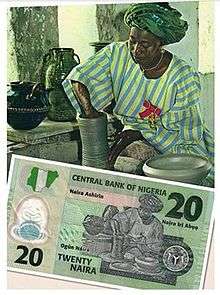Ladi Kwali
| Ladi Kwali | |
|---|---|
 Ladi Kwali | |
| Born |
Ladi Kwali 1925 Kwali, Nigeria |
| Died | 12 August 1984 |
| Occupation | Potter |
Ladi Kwali (c.1925-1984) was a Nigerian potter.
She was born in the village of Kwali in the Gwari region of Northern Nigeria, where pottery was a common occupation among women. She learned to make pottery as a child using the traditional method of coiling. She made large pots for use as water jars and cooking pots from coils of clay, beaten from the inside with a flat wooden paddle. They were decorated with incised geometric and stylised figurative patterns. Following the traditional African method, they were fired in a bonfire of dry vegetation
Her pots were noted for their beauty of form and decoration. Several were acquired by the Emir of Abuja, Alhaji Suleiman Barau,[1] in whose home they were seen by Michael Cardew in 1950. In 1954, she joined Cardew's pottery training centre in Abuja, its only woman potter, where she learned to throw pots on the wheel. She made dishes, bowls and beakers with sgraffito decoration but also continued to produce pots using her traditional hand building and decorating techniques. Most of these were glazed and fired in a high-temperature kiln and therefore represent an interesting hybrid of traditional African with western studio pottery [2]
Through Kwali's contact with Cardew, she and her work became known in Europe, Britain and America. In the late 1950s and early 1960s, her work was shown to great acclaim in London at the Berkeley Galleries. She became Nigeria's best-known potter, was awarded a doctorate and was made MBE in 1962. The Abuja Pottery was renamed the Ladi Kwali Pottery and a major street in Abuja is called Ladi Kwali Road.
Her picture appears at the back of the Nigerian 20 Naira bill.[3]
Career
Kwali joined Michael Cardew's pottery training center in Abuja in 1954. Cardew had come to Nigeria to take up the post of Pottery Officer in the Department of Commerce and Industry.[4] He founded the center in Abuja, and worked there until his retirement in 1965. Kwali was the first woman to join.
Awards and achievements
Kwali was awarded an MBE (Member of the British Empire) in 1962.[5]
In 1980, the Nigerian Government (from the Cabinet Office of the Federal Republic of Nigeria) invested on her with the insignia of the Nigerian National Merit Award (NNMA), the highest national honor for academic achievement.[1]
She also received the national honor of the Officer of the Order of the Niger (OON) in 1981.[1]
References
- 1 2 3 "History of Ladi Kwali, the Famous Nigerian Potter". Abuja Facts. February 8, 2015. Retrieved January 18, 2016.
- ↑ Ladi Kwali - http://www.studiopottery.com/cgi-bin/mp.cgi?item=251
- ↑ Remembering Dr. Hadiza Ladi Kwali 29 years after - http://www.dailytrust.com.ng/weekly/index.php/tribute/13552-remembering-dr-hadiza-ladi-kwali-29-years-after . Retrieved 27th of November, 2014
- ↑ Ladi Kwali, Nigerian Potter, retrieved 2016-01-18
- ↑ "Supplement to the London Gazette". 25 May 1962. Retrieved 18 January 2015.